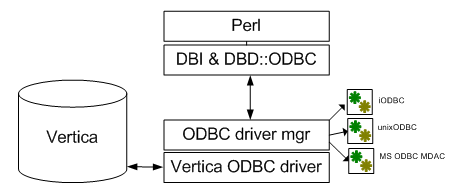Configuring a Perl development environment
Perl has a Database Interface module (DBI) that creates a standard interface for Perl scripts to interact with databases. The interface module relies on Database Driver modules (DBDs) to handle all of the database-specific communication tasks. The result is an interface that provides a consistent way for Perl scripts to interact with many different types of databases.
Note
With Perl ODBC clients, Vertica allows a forked process (a child process) to drop the parent connection to the Vertica server when the child process completes and exits. Vertica allows this behavior regardless of the setting of the Perl DBI AutoInactiveDestroy attribute.
To change the default setting so that Vertica honors the setting of the Perl DBI AutoInactiveDestroy attribute, add the parameter CleanupInForkChild to your vertica.ini file, and set its value to 1. When the Perl DBI AutoInactiveDestroy attribute is set to 1, and the Vertica parameter CleanupInForkChild is set to 1, Vertica does not drop the parent connection upon child process completion.
Perl scripts can interact with Vertica using the Perl DBI module along with the DBD::ODBC database driver to interface to the Vertica ODBC driver. See the CPAN pages for Perl's DBI and DBD::ODBC modules for detailed documentation.

A Perl development environment depends on the Vertica ODBC driver and the DBI and DBD::ODBC modules.
-
Verify that Perl is installed with the following command. If this command does not return version information, you must install Perl. For version support, see Perl driver requirements.
$ perl -v -
Install compatible versions of the Perl modules DBI and DBD::ODBC. Installation methods vary between environments. For details on installing Perl modules, see the cpan documentation.
-
Run the following commands to verify that DBI and DBD::ODBC are installed. If installed, these commands should return nothing. Otherwise, they return an error:
$ perl -e "use DBI;" $ perl -e "use DBD::ODBC;"
Listing DSNs and verifying the installation
Another way to verify your installation is with the following Perl script. This script verifies if DBI and DBD::ODBC are installed and prints your ODBC DSN, if any:
#!/usr/bin/perl
use strict;
# Attempt to load the DBI module in an eval using require. Prevents
# script from erroring out if DBI is not installed.
eval
{
require DBI;
DBI->import();
};
if ($@) {
# The eval failed, so DBI must not be installed
print "DBI module is not installed\n";
} else {
# Eval was successful, so DBI is installed
print "DBI Module is installed\n";
# List the drivers that DBI knows about.
my @drivers = DBI->available_drivers;
print "Available Drivers: \n";
foreach my $driver (@drivers) {
print "\t$driver\n";
}
# See if DBD::ODBC is installed by searching driver array.
if (grep {/ODBC/i} @drivers) {
print "\nDBD::ODBC is installed.\n";
# List the ODBC data sources (DSNs) defined on the system
print "Defined ODBC Data Sources:\n";
my @dsns = DBI->data_sources('ODBC');
foreach my $dsn (@dsns) {
print "\t$dsn\n";
}
} else {
print "DBD::ODBC is not installed\n";
}
}
If your system is properly configured, the output should resemble the following:
DBI Module is installed
Available Drivers:
ADO
DBM
ExampleP
File
Gofer
ODBC
Pg
Proxy
SQLite
Sponge
mysql
DBD::ODBC is installed.
Defined ODBC Data Sources:
dbi:ODBC:dBASE Files
dbi:ODBC:Excel Files
dbi:ODBC:MS Access Database
dbi:ODBC:VerticaDSN